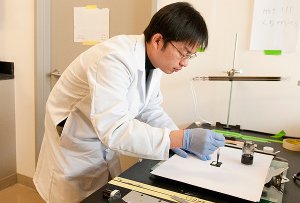Dec 7 2009
Stanford scientists are harnessing nanotechnology to quickly produce ultra-lightweight, bendable batteries and supercapacitors in the form of everyday paper.
 Bing Hu, a post-doctoral fellow, prepares a small square of ordinary paper to with an ink that will deposit nanotubes on the surface that can then be charged with energy to create a battery.
Bing Hu, a post-doctoral fellow, prepares a small square of ordinary paper to with an ink that will deposit nanotubes on the surface that can then be charged with energy to create a battery.
Simply coating a sheet of paper with ink made of carbon nanotubes and silver nanowires makes a highly conductive storage device, said Yi Cui, assistant professor of materials science and engineering.
"Society really needs a low-cost, high-performance energy storage device, such as batteries and simple supercapacitors," he said.
Like batteries, capacitors hold an electric charge, but for a shorter period of time. However, capacitors can store and discharge electricity much more rapidly than a battery.
Cui's work is reported in the paper "Highly Conductive Paper for Energy Storage Devices," published online this week in the Proceedings of the National Academy of Sciences.
Dip an ordinary piece of paper into ink infused with carbon nanotubes and silver nanowires, and it turns into a battery or supercapacitor. Crumple the piece of paper, and it still works. Stanford researcher Yi Cui sees many uses for this new way of storing electricity. Credit: Jack Hubbard, Stanford News Service
"These nanomaterials are special," Cui said. "They're a one-dimensional structure with very small diameters." The small diameter helps the nanomaterial ink stick strongly to the fibrous paper, making the battery and supercapacitor very durable. The paper supercapacitor may last through 40,000 charge-discharge cycles - at least an order of magnitude more than lithium batteries. The nanomaterials also make ideal conductors because they move electricity along much more efficiently than ordinary conductors, Cui said.
Cui had previously created nanomaterial energy storage devices using plastics. His new research shows that a paper battery is more durable because the ink adheres more strongly to paper (answering the question, "Paper or plastic?"). What's more, you can crumple or fold the paper battery, or even soak it in acidic or basic solutions, and the performance does not degrade. "We just haven't tested what happens when you burn it," he said.
The flexibility of paper allows for many clever applications. "If I want to paint my wall with a conducting energy storage device," Cui said, "I can use a brush." In his lab, he demonstrated the battery to a visitor by connecting it to an LED (light-emitting diode), which glowed brightly.
A paper supercapacitor may be especially useful for applications like electric or hybrid cars, which depend on the quick transfer of electricity. The paper supercapacitor's high surface-to-volume ratio gives it an advantage.
"This technology has potential to be commercialized within a short time," said Peidong Yang, professor of chemistry at the University of California-Berkeley. "I don't think it will be limited to just energy storage devices," he said. "This is potentially a very nice, low-cost, flexible electrode for any electrical device."
Cui predicts the biggest impact may be in large-scale storage of electricity on the distribution grid. Excess electricity generated at night, for example, could be saved for peak-use periods during the day. Wind farms and solar energy systems also may require storage.
"The most important part of this paper is how a simple thing in daily life - paper - can be used as a substrate to make functional conductive electrodes by a simple process," Yang said. "It's nanotechnology related to daily life, essentially."
Cui's research team includes postdoctoral scholars Liangbing Hu and JangWook Choi, and graduate student Yuan Yang.